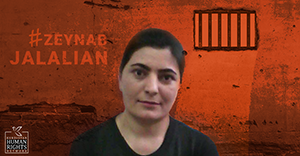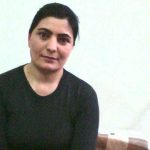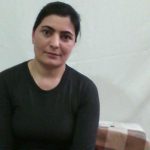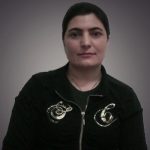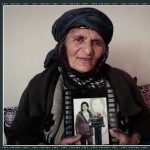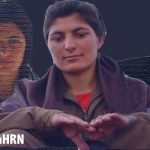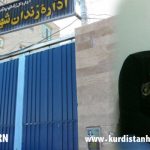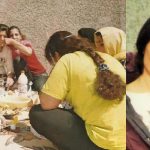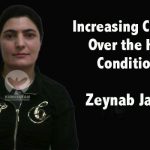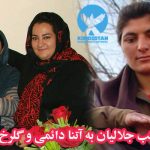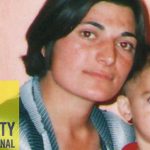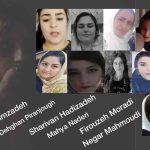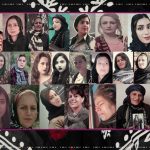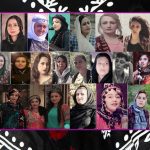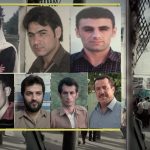Zeynab Jalalian moved to the Kurdistan Region of Iraq with one of her sisters in 1999.
She initially joined the Kurdistan Workers’ Party (PKK) and in 2003, after the establishment of the Kurdistan Free Life Party (PJAK), became a member of its women’s branch.
She is Iran’s longest-serving and only female political prisoner serving a life sentence.
Throughout her imprisonment, Jalalian has been denied the right to temporary leave and has been illegally transferred several times to different prisons across the country.
Arrest
In February 2008, while travelling on an intercity minibus from Kamyaran, Kurdistan Province, to Kermanshah, Kermanshah Province, she was arrested by agents of the Ministry of Intelligence at the entrance to the city in front of dozens of passengers.
She was taken to the Ministry’s detention centre in Kermanshah, where she spent more than three months in solitary confinement.
During this time, she was subjected to severe torture and even threatened with rape, while being denied contact with her family and access to a lawyer, with her family unaware of her arrest for almost two months.
Jalalian later described instances of torture during her arrest and imprisonment in her letters and phone calls from prison.
Additionally, several of her former cellmates have testified to signs of torture on her body, and human rights organisations have reported and condemned these acts of torture.
Judicial Process
In a trial held on 3 December 2008, she was sentenced to death by Branch One of the Islamic Revolutionary Court in Kermanshah, presided over by Judge Ali Moradi.
The charges against her included “enmity against God” (moharebeh) through “armed action against the Islamic Republic, membership of PJAK, possession and maintenance of military weapons and equipment, and propaganda activities in favour of anti-state groups”.
However, according to the court verdict, Jalalian was unarmed at the time of her arrest, and no military equipment was found on her and the Ministry of Intelligence officials also failed to present any evidence of her involvement in an armed operation.
Nonetheless, the judge issued a death sentence based on the presumption of her potential involvement in armed activities.
According to Jalalian’s lawyers, at all stages of her interrogation she consistently denied any involvement in armed confrontation against the Islamic Republic, stating that her activities were political and in line with the programmes of the women’s branch of PJAK.
Despite this, her death sentence was upheld by the Kermanshah Court of Appeals on 6 May 2009, presided over by Mohammad Ali Roshani.
In October 2011, coinciding with Supreme Leader Ali Khamenei’s visit to Kermanshah, Jalalian’s sentence was commuted from execution to life imprisonment through the “Leader’s Amnesty”, based on the recommendation of the Amnesty and Clemency Commission of the provincial judiciary.
Her lawyer, Amir Salar Davoudi, stressed in an interview that Jalalian’s request for clemency was not initiated by her or her legal representatives, but was proposed directly by the Amnesty and Clemency Commission of Kermanshah Province.
Explaining the cancellation of Jalalian’s death sentence as a result of this clemency, he said: “The reason for this proposal by the Kermanshah Amnesty and Clemency Commission was that the provincial office of the Ministry of Intelligence withdrew its initial report about Zeynab Jalalian being armed and using weapons and admitted its mistake. This report is in the case file and has a reference number. But the question is why the Ministry of Intelligence’s report, which was previously the basis for the conviction, is now only the basis for clemency from the death penalty. In fact, the public prosecutor could have asked for a retrial in light of this report.”
Jalalian’s lawyer also believes that according to the new Islamic Penal Code, passed in 2013, her continued imprisonment is against the law: “The Islamic Penal Code was amended in 2013 regarding charges related to armed confrontation against the Islamic Republic or membership of armed groups. Essentially, the charge of ‘enmity against God’ for which Zeynab had been sentenced was removed in relation to political accusations and an equivalent charge was considered. According to this law, if an individual is arrested without a weapon and detained until the central command of the group is intact, they will be sentenced to 10 to 15 years in prison. This law applies not only to Zeynab, but also to many other convicted individuals. If it had been applied, Zeynab’s sentence would have been reduced to third-degree punitive imprisonment and she would have been released by now. In fact, with the enactment of the new law, both the Prosecutor General and the prosecutor overseeing the case could have requested a review.”
Legal experts also believe that under the principle of “interpretation in favour of the accused”, the sentences of those previously sentenced to life imprisonment should be re-evaluated.
Additionally, under the usual judicial procedures, all those sentenced to life imprisonment are eligible for clemency and release, subject to the discretion of the head of the judiciary and the approval of the Supreme Leader of the Islamic Republic.
Current Status
Since November 2020, Jalalian has been held in Yazd Prison, 1,500 kilometres away from her family’s residence.
She suffers from several health conditions, including oral thrush, pterygium (eye condition), asthma, and kidney and gastrointestinal issues, all of which she has developed during her time in prison.
Notes:
1. The Kurdistan Workers’ Party (PKK) was founded in 1978 with the aim of creating a unified and independent Kurdistan. Although its origin and leadership were in the Kurdistan of Turkey, its activities gradually extended to other parts of Kurdistan, including Iranian Kurdistan. From its inception until the late 1990s, Marxism-Leninism was the dominant ideology of the party.
Abdullah Öcalan, known as Apo, the leader of the PKK, was captured in 1999 through a joint operation by the Turkish government and several other countries in Kenya. He is currently serving a life sentence in solitary confinement on Imrali Island in the Sea of Marmara.
Since 2000, influenced by Öcalan’s writings and ideas in prison, the PKK has aimed to establish “democratic confederalism” in the four parts of Kurdistan: Turkey, Iraq, Syria, and Iran, and works towards this goal. The headquarters of this party is in the mountainous border regions between the Kurdistan of Iran, Turkey, and Iraq.
2. The Kurdistan Free Life Party (PJAK) was established in 2004 in the Qandil Mountains along the border of Iraqi Kurdistan with Iranian Kurdistan. This party follows the ideas of Abdullah Öcalan, the imprisoned leader of the Kurdistan Workers’ Party (PKK), and bases its activities on the paradigm of a “democratic and ecological society based on women’s freedom”.
According to the party’s charter, PJAK considers the establishment of democratic confederalism and a political form of democratic self-governance for organising people to build a “democratic nation” as one of its fundamental goals. PJAK also participated in the establishment of the East Kurdistan Democratic and Free Society (KODAR). The headquarters of this party is in the mountainous areas between Iraqi Kurdistan and Iranian Kurdistan.
3. Article 279 of the Islamic Penal Code: “Moharebeh (enmity against God) is defined as drawing a weapon with the intention of killing, stealing from, or intimidating people in a way that causes insecurity in the environment.” According to Article 282 of the Islamic Penal Code, “if a person commits the crime of moharebeh, they will be sentenced to crucifixion, execution, amputation of the right hand and left foot, or exile, at the discretion of the judge.”
4. Articles 287 and 288 of the new Islamic Penal Code regarding the charge of “armed insurrection” (bagh): “A group that engages in armed insurrection against the foundation of the Islamic Republic of Iran is considered rebellious, and if they use weapons, the members shall be sentenced to the death penalty. If the members of the rebellious group are apprehended before engaging in conflict or using weapons, they shall be sentenced to a third-degree imprisonment if the organisation and leadership structure remains intact. However, if the organisation and leadership have been dismantled, they shall be sentenced to a fifth-degree imprisonment.” According to Article 19 of the Islamic Penal Code, discretionary punishments are divided into eight degrees, with third-degree imprisonment ranging from more than 10 to 15 years.

